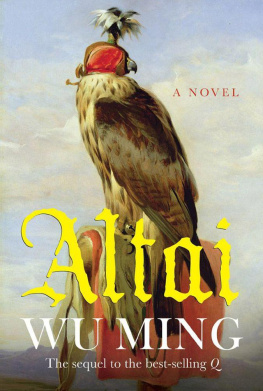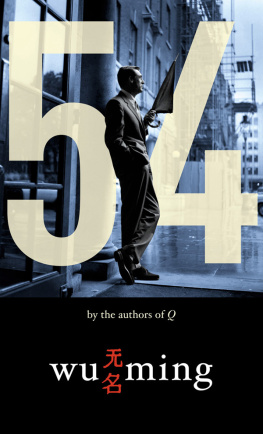Drifting on the sea go the swift ships.
Slacken the sails, there, loosen the ropes,
catch the wind and save your companions
if you want us to remember your name.
Stay far off, go not where the troubled wave rises.
Now it depends on you.
Archilochus, seventh century BC
Prologue, Constantinople, 8 Muharram 977 (June 23, 1569)
From the rooms in the palace no sounds come. The smell of the Bosphorus and the muezzins chant accompany the living into the evening, toward a semblance of peace. Beyond the open windows, the sky is ablaze with purple and gold. Fishing boats part from Asia and drift on the honeyed current.
A thought takes hold of Gracia: The greatest artists in the world and she knew many of them when she was in Europe can only imitate the beauty that the Lord has given us; they can never match his wonder.
She lifts the pen from the paper; now she is holding her hand in midair. Her eyes are closed as she listens to the chant.
As the last note fades away, she signs and seals the letter, and finally she relaxes against the back of her chair.
Dana watches her, studies her desk. The letters already sealed, and those awaiting a reply. She knows that the Senyora is exhausted. She wont be able to spend the evening writing, as she did until a short time ago. Her strength is leaving her, and there is still so much to do. Everyone is calling to her, from one end of the Mediterranean, and Europe, to the other. Fleeing exiles, persecuted Jews, Sephardic merchants, Ashkenazic rabbis.
Help me, Gracia says. I want to get up.
Dana tells her off: You shouldnt stand up, my Senyora. You shouldnt even sit at your desk. You should rest.
Dana knows its her part in the play, and she performs it every evening. Donna Gracia will repeat her order, her maidservant will obey, the Senyora will put an arm around her and take a few steps into the room, accepting with serenity the creaking of her joints.
The mirror on the wall is covered by a green cloth. For some time now, Gracia has relinquished makeup or any form of ostentation. She has given up admiring herself, but tonight she moves the cloth aside and looks at her own image. Over the past few years she has obscured herself. Dana takes care of her body every morning, with the greatest possible attention.
She is fifty-nine years old, and in the pane she sees the face of an old woman. Wrinkles at the sides of her eyes and mouth, the skin of her neck loose and pendulous, her nose pointed, her silver hair opaque. She studies the folds in her face, seeks the girl who one night received a secret name, and the following day a Christian baptism to protect her from the Inquisition. Beatriz de Luna Miquez.
Looking into her own eyes, Gracia seeks the lights and shadows of the alleys of Lisbon, the house of her childhood and her earliest youth, little Yossef who called her aunt. Memories, the voice of his mother, the story of how the Miquez family fled from Spain.
Beneath the layers of time, in the curve of her eyebrow, is the girl who was married to Francisco Mendez, el Gran Judio, and who had to bury him too soon and found herself left with a little daughter and the huge family finances to fetch to safety.
This is what her life has largely been like: the life of a wealthy Jewish widow, in business, fighting against princes, kings, and emperors, first in the Low Countries, then in Venice, and finally in Constantinople.
In the face of the Senyora, Dana sees an ancient queen, whose devoted subjects are scattered from one end of the world to the other. Over the past fifteen years she has done her best to reunite them and drip them, drop by drop, inside the borders of the Ottoman empire. As the shepherd pulls from the lions mouth two feet or the lobe of an ear, so the Israelites will escape. Its the first passage of a most ambitious project that among a thousand difficulties is taking shape down there, in Tiberias, where the Senyora wants to go to die.
Dana glances outside at the stretch of sea in front of the palace. She wonders if the letter will arrive. She knows that it is bound for a man far away the Senyora mentions him from time to time, in phrases dense with love and compassion. Phrases from an intimate past.
Gracia lets the cloth fall back. Weariness is calling to her, claiming her, dragging her to itself, deeper and further away. Dana walks her to the bed and helps her to lie down, arranges the pillows behind her back, unlaces her dress, and then they sit there, looking at the waves and the vessels beyond the window.
Its time for me to go down there, Gracia murmurs, her eyes half closed.
Take me with you, my Senyora, Dana pleads.
She strokes her face, takes one hand between her own.
No, my little one. You must stay by Reynas side. You must live.
Then she juts her chin toward the desk.
Take the letter. Send it to you know who.
Part One. Mi Star, September 13December 10, 1569
When the thunder came I was still awake. Sitting at the table, I was flicking through accusations and denunciations by candlelight. I was committing to memory the names and addresses of spies. Then my ears exploded, the floor shook, I was caught in a rain of glass and plaster. For days afterward I was picking shards from my hair.
I raised my head. The room was dark, but the shattered window framed a glare of light. It looked like sunrise, but it was the depths of night, and the wind carried the smell of cannon fire.
I got up and saw torches floating beneath the stars, behind the steeple of San Francesco. The tezoni, I thought. The dry docks, the Arsenal. The heart of La Serenissima in flames.
I dashed down the stairs. The main door of the palazzo had come off its hinges, but it was obstructed by a pile of rubble. I found a crack and pushed it until at last I emerged on the other side. In the calle, stunned faces quizzed one another in terrified silence. The more daring whispered the words earthquake and Apocalypse. Whole families were fleeing their homes, some leaping down from their balconies as if from the sides of a sinking ship.
The second explosion scattered the herd in a cloud of ashes and screams. I leapt into the middle of the calle to escape an avalanche of tiles, looked up, and saw them: two gondolas flying in the sky of Venice. They had wings of flame and they flew in uncertain arcs, like wounded birds. One crashed into the bell tower, which was sounding a constant fire alarm. The other disappeared from sight, beyond the rooftops.
In the hours and days that followed I would hear a thousand stories about what happened that night, and in each one it was a different object that was flying. Oak trunks came hurtling down, millstones for saltpeter, buckets of pitch, roasted corpses of men and horses, then dragons, comets, stellar explosions, the Madonna and Lucifer, Christ crucified and Christ resurrected.
I had to get to the Arsenal, join my men, stop and question as many people as possible. My legs started running as a gray veil fell over the city. It fell on the gawping crowd; it fell on the wounded, turning them into living statues. It fell on the wine carriers who came running with barrels and on the old people who stood speechless in front of the skeletons of their houses. It fell on the canals of Castello, so full of ash and rubble that the water itself seemed to be made of stone. It fell on the bodies on the ground, which looked like corpses but were not in fact dead, because only about twenty people had died, and the rest were prevented from getting up by the fear that the sky might crash down on their heads.






![Bosworth - Italian Venice: a history[Electronic book]](/uploads/posts/book/194557/thumbs/bosworth-italian-venice-a-history-electronic.jpg)


